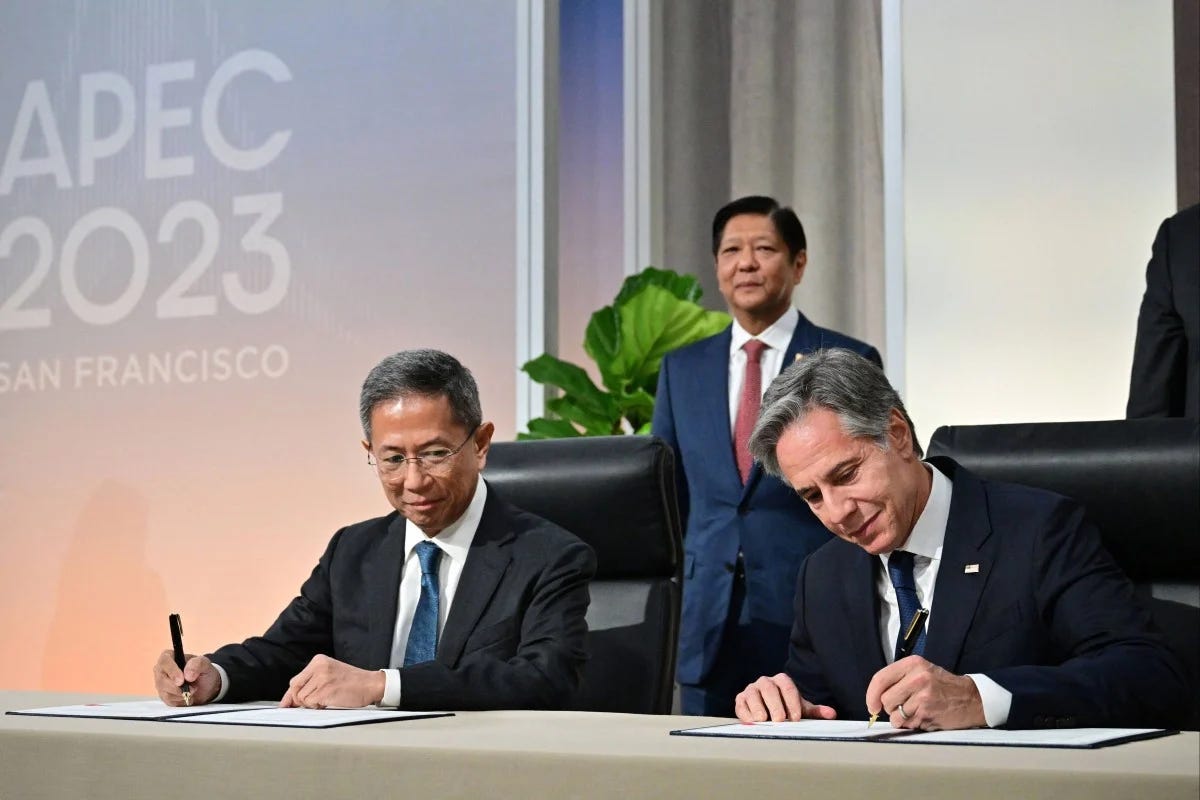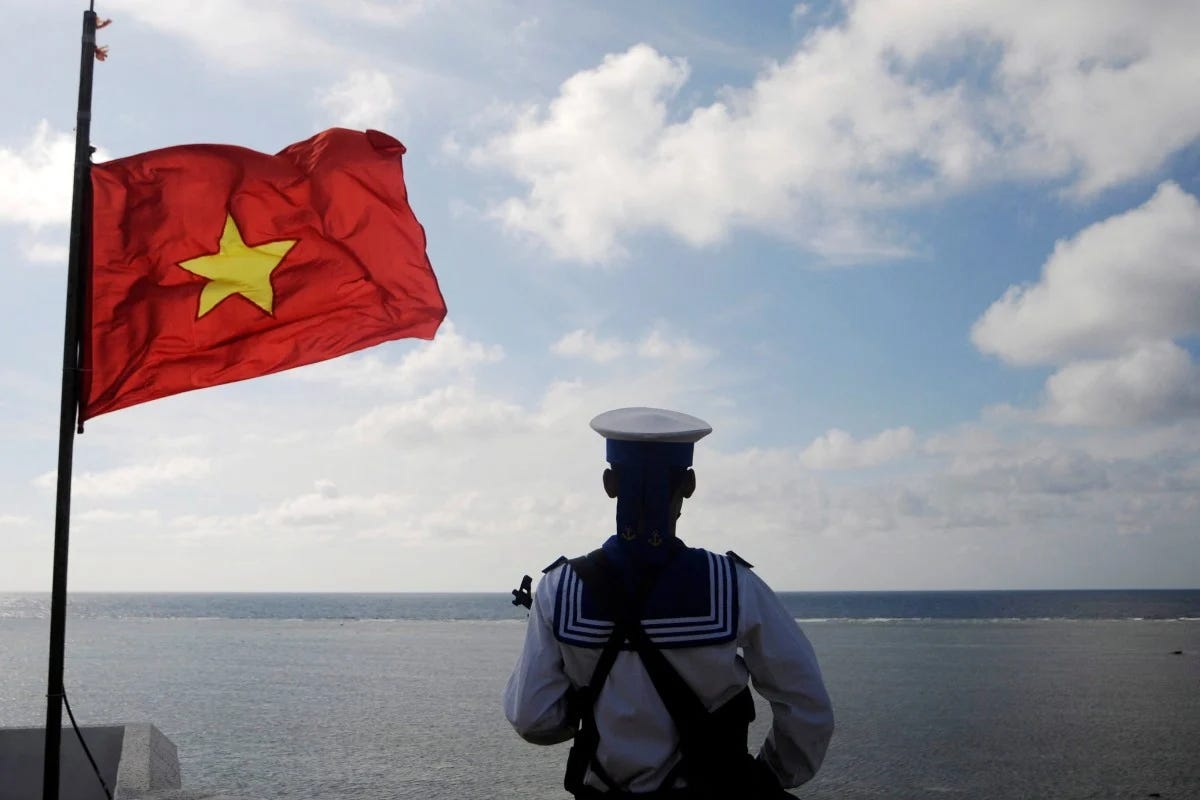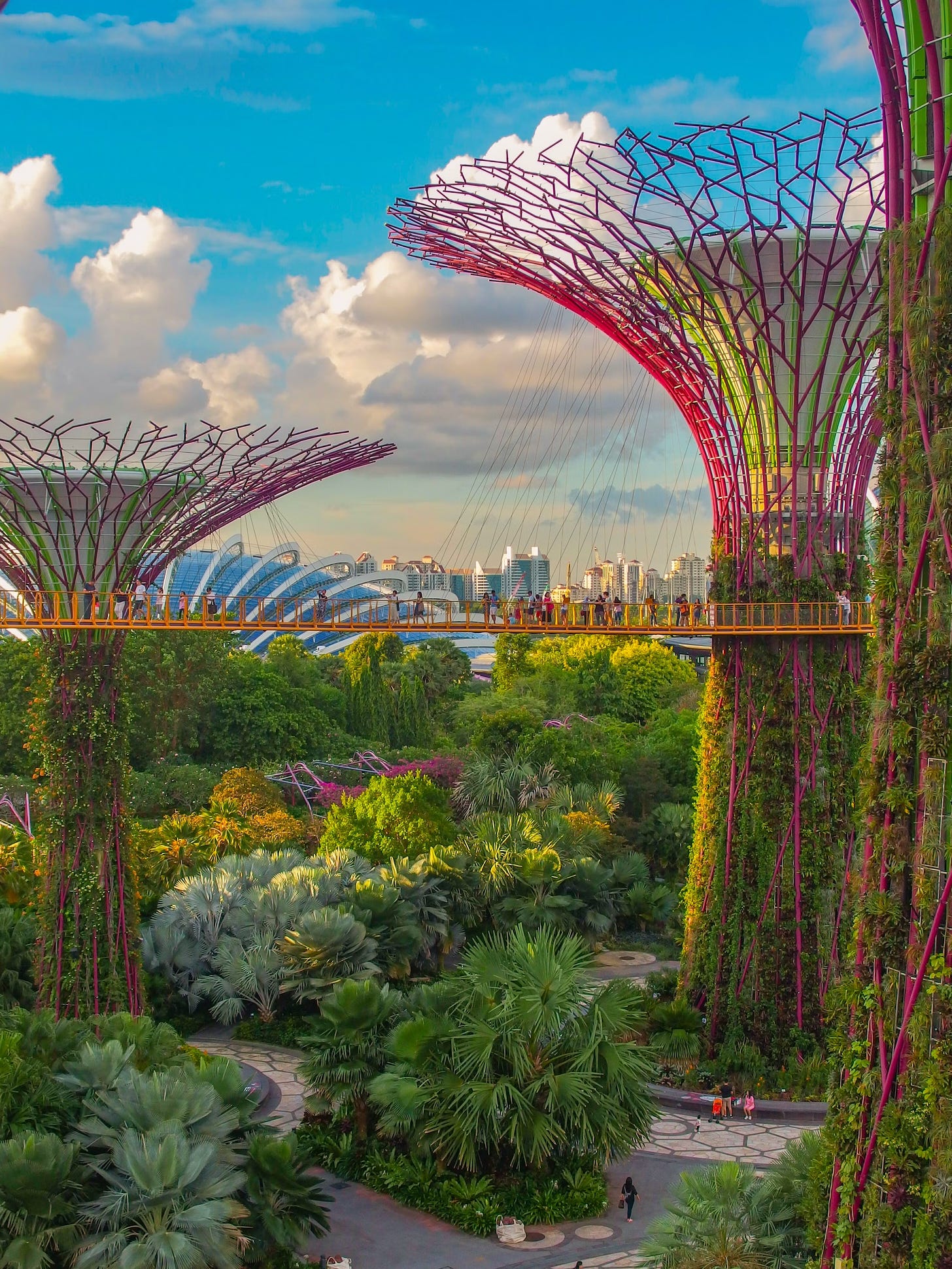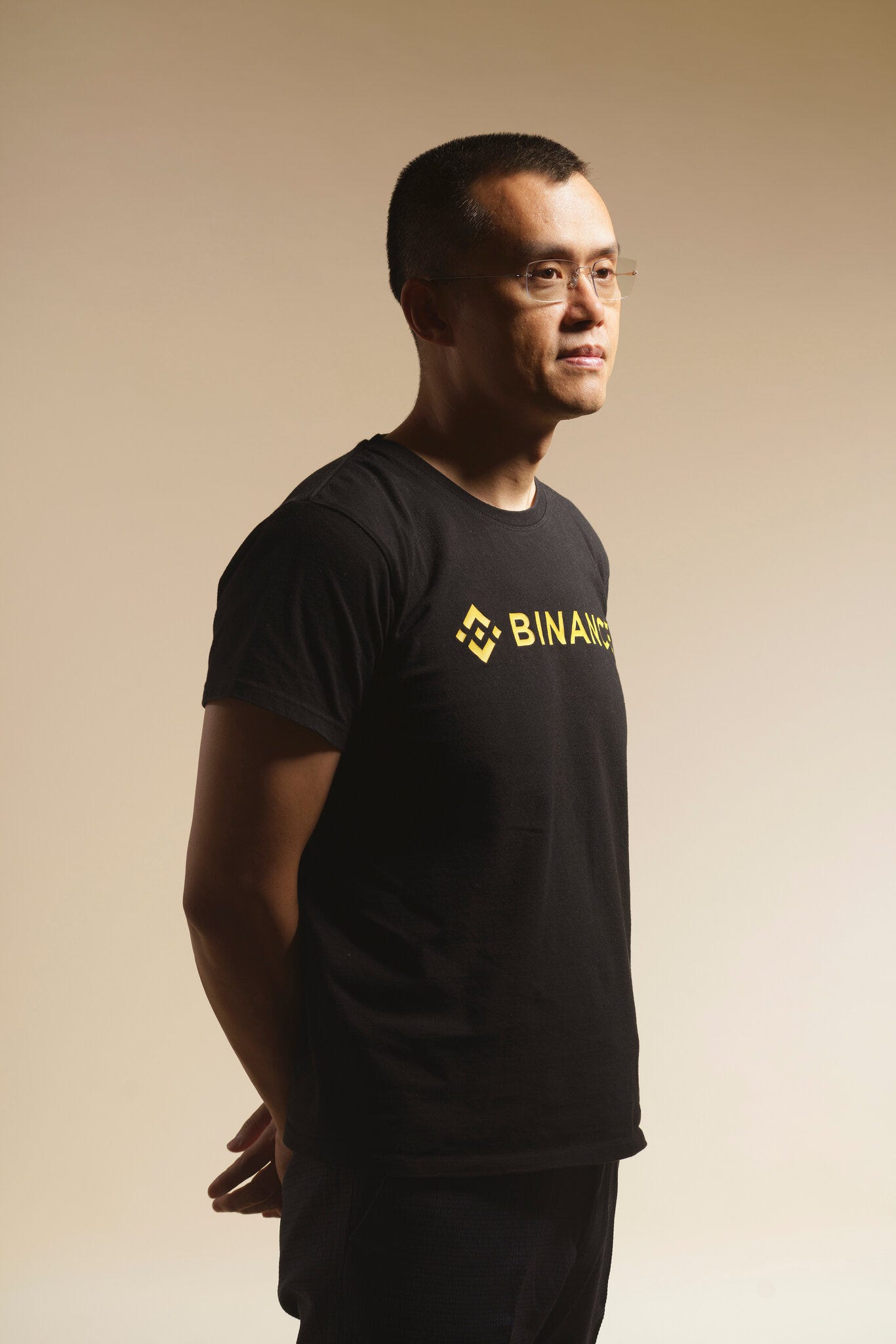Southeast Asian & World Briefs (23 Nov): US-Philippine Nuclear Deal; OpenAI and Binance Drama
Welcome to Thursday, readers!
In this issue, we spotlight the groundbreaking US-Philippines nuclear technology agreement, a major stride in energy collaboration and a symbol of shifting geopolitical alliances. We also examine Vietnam's significant territorial expansion in the contentious South China Sea, even with ongoing tension between China and other ASEAN countries and their allies in the region.
In the economic sphere, we highlight Singapore's unexpectedly robust Q3 growth, signalling a potential economic upturn amidst global challenges. Meanwhile, Thailand takes a historic step towards inclusivity, moving to legalize same-sex marriage.
Lastly, in a dramatic turn of events, we cover Sam Altman's reinstatement as CEO of OpenAI after a brief but tumultuous departure, a story that underscores the rapidly evolving landscape of AI and tech governance. Additionally, the Binance money laundering scandal marks a significant moment in the crypto world, with implications for regulatory practices globally.
Let’s get right into it!
Tables of Contents and Summaries
Geopolitics
🤝 US and Philippines Sign Deal for Nuclear Technology Sharing
The US and the Philippines sign a landmark 123 Agreement, aiming to boost the Philippines' energy independence and reduce carbon emissions by incorporating nuclear power into their energy mix. This deal requires US Congress approval and follows previous unsuccessful attempts to launch nuclear energy projects in the Philippines.
⚒️ Vietnam Expands Land in South China Sea's Spratly Islands
Vietnam accelerates its land expansion in the Spratly Islands, adding 330 acres since December, surpassing its previous decade's expansion. This move positions Vietnam as a significant player in the geopolitically tense South China Sea, where several countries contest territorial claims.
Social/Economic
📈 Singapore's Economy Performs Better Than Expected in Q3
Singapore's Q3 2023 GDP growth exceeded expectations, marking a turnaround from Q2. The government projects continued growth into 2024, supported by a strong tourism sector, manufacturing, and global electronics demand, despite global economic risks.
🏳️🌈 Thailand Cabinet Approves Amendment Allowing Same-Sex Marriage
Thailand's cabinet moves to legalize same-sex marriage, changing legal language to be more inclusive. The proposed law, reflecting changing social attitudes, would make Thailand the third place in Asia to permit same-sex marriage if passed by Parliament.
🏥 Malaysia's Penang Targets Chinese Medical Tourists for Growth
Penang, Malaysia, aims to attract Chinese medical tourists, focusing on services like fertility treatments. The region's medical tourism industry, part of Malaysia's broader strategy, benefits from direct flights from China and offers a blend of healthcare and tourism experiences.
🧠 All the Key Drama on OpenAI: Sam Altman Reinstated as OpenAI’s CEO
After a brief ousting, Sam Altman returns as OpenAI's CEO amidst a major board reshuffle. The company faced internal turmoil and a potential employee exodus, leading to significant changes in governance, with Microsoft backing these changes.
💰 Binance Founder Pleads Guilty to Money Laundering, Company to Pay USD 4.3 Billion Fine
Binance's founder pleads guilty to money laundering, resulting in a hefty fine for the company and a step down from his CEO role. Binance's market share has declined amid these developments, and its future remains uncertain as regulatory scrutiny intensifies.
Geopolitics
US and Philippines Sign Deal for Nuclear Technology Sharing

The United States and the Philippines have signed an agreement to transfer nuclear technology and material from the US to the Philippines.
This landmark deal aims to support the Philippines in exploring nuclear power as part of its energy mix to reduce carbon emissions and enhance energy independence.
The Philippines plans to include nuclear energy in its energy mix by 2032, aiming to provide affordable, reliable, and sustainable energy to meet growing demands.
The Philippines sees nuclear power as a viable alternative to coal.
Pending approval: The agreement requires approval from the US Congress and complies with non-proliferation requirements.
The US has similar agreements with 47 countries and organizations, including the International Atomic Energy Agency and Taiwan.
Not the first try on nuclear: Previous attempts to pursue nuclear energy in the Philippines were halted due to safety concerns, but the government is considering reviving a mothballed nuclear power plant.
The Bataan Nuclear Power Plant, completed in 1984, was mothballed in 1986 due to various factors, including the Chernobyl disaster and corruption allegations.
Vietnam Expands Land in South China Sea's Spratly Islands

Vietnam has increased its land expansion efforts in the Spratly Islands, adding approximately 330 acres of land since December last year, according to a report by the S think tank, the Centre for Strategic and International Studies (CSIS).
This expansion exceeds the 120 acres added between 2012 and 2022 and ranks Vietnam second to China in terms of island-building activities in the Spratly Islands.
The South China Sea is a highly disputed region where more than $3 trillion in trade passes annually, with China, Brunei, Malaysia, the Philippines, Taiwan, and Vietnam having competing territorial claims.
Current progress: Vietnam has employed cutter suction dredgers to expedite its dredging activities, recently targeting South Reef and Central Reef.
While land expansion has occurred, infrastructure construction on these new islands has not yet commenced.
Social/Economic
Singapore's Economy Performs Better Than Expected in Q3
Singapore's GDP in Q3 2023 grew 1.4% from the previous quarter, higher than the preliminary reading of 1% and a turnaround from a 0.1% gain in Q2.
The economy increased by 1.1% in Q3 YoY, compared to an earlier estimate of 0.7% gain and 0.5% growth in Q2.
GDP growth for the first three quarters of the year stood at 0.7%, prompting the government to revise its full-year outlook to around 1%.
The government forecasts economic expansion to accelerate further to an estimated 1% to 3% in 2024.
Hopeful: The city-state is optimistic about its tourism sector, manufacturing, and trade as global electronics demand improves.
Singapore's currency, the Singapore dollar, remained steady against the US dollar.
The Monetary Authority of Singapore believes its current policy stance is appropriate.
While there are global risks such as elevated borrowing costs and volatile energy prices, the country expects a rebound in the travel and aviation sectors to drive growth, along with robust labor-market conditions.
Thailand Cabinet Approves Amendment Allowing Same-Sex Marriage
Thailand's cabinet has approved an amendment to the Civil and Commercial Code that will allow same-sex marriage.
The amendment changes the language from "men and women" and "husband and wife" to "individuals" and "marriage partners" for same-sex couples to have the same rights as heterosexual couples.
The next step will be an amendment to the pension fund law to recognize same-sex couples as well.
The draft law is expected to be proposed to Parliament on December 12, and if approved, Thailand will become the third place in Asia, after Taiwan and Nepal, to allow same-sex marriage.
Legal lags behind: Thailand has a visible LGBTQ+ community, but laws and traditional institutions have been slow to reflect changing social attitudes.
Previous attempts to pass marriage equality or civil union bills failed, but the new government has revived the effort to pass a marriage equality bill.
Thailand's Prime Minister has expressed a desire for Bangkok to host World Pride events in 2028.
Malaysia's Penang Targets Chinese Medical Tourists for Growth
Medical tourism has become a significant source of revenue for Malaysia, particularly in Penang, and the country is now targeting Chinese nationals seeking treatment options abroad.
Malaysia's medical tourism industry rebounded quickly after pandemic travel restrictions were lifted, reaching MYR 1.3 billion (about USD 279 million) in revenue in 2022, up from MYR 585 million in 2021.
To continue growing its medical tourism industry, Malaysia aims to attract more medical tourists from China, leveraging the country's large population and growing affluence.
Fertility hub: Penang, known for its medical services, is looking to tap into the Chinese medical tourism market, offering services such as fertility treatments and regenerative medicine.
Penang's reputation as a high-quality holiday destination also makes it appealing to medical tourists.
Access to Penang is facilitated by direct flights from cities like Guangzhou and Xiamen in China, with discussions ongoing about potential direct flights from Beijing and Shanghai.
Malaysia's 90-day tourist visas for Hong Kong residents may also lead to a rise in medical tourists from the Special Administrative Region.
For every MYR spent by a medical tourist on treatment, an additional MYR 4 is spent on related industries like hospitality and transport.
All the Key Drama on OpenAI: Sam Altman Reinstated as OpenAI’s CEO

Sam Altman has been reinstated as OpenAI’s chief executive after being ousted by the company’s board last week.
The board of directors will be overhauled, with Adam D’Angelo of Quora as the only holdover.
OpenAI's board had initially decided to push Altman out, but as an employee revolt grew, board member Ilya Sutskever had second thoughts and signed a letter supporting Altman's return.
Altman and Greg Brockman, OpenAI’s president who resigned in solidarity, will return to the company.
Board change: The reshuffled board will include Bret Taylor, Lawrence Summers, and Adam D’Angelo, with Taylor serving as chairman.
Microsoft supported the changes, with CEO Satya Nadella calling them a "first essential step on a path to more stable, well-informed, and effective governance."
At one point, over 700 of OpenAI's 770 employees have signed a letter stating that they may leave the company for Microsoft if the ousted CEO, Sam Altman, is not reinstated.
Thrive Capital is leading a new funding offer that will value OpenAI at more than $80 billion.
Why was he ousted: Sam Altman was removed from his position by four of the company's six board members, led by Ilya Sutskever, due to concerns over AI safety and Altman's leadership.
The conflict reflects a divide in the AI community between those who see AI as a significant business opportunity and those who are concerned about its risks.
OpenAI was founded on the belief that it could build AI safely, but its rapid success raised concerns about the pace of growth and AI safety.
Sutskever and Altman were unable to reach a consensus on the company's direction, leading to Altman's removal.
OpenAI's board has not provided a specific reason for Altman's removal, other than citing communication issues.
Binance Founder Pleads Guilty to Money Laundering, Company to Pay USD 4.3 Billion Fine
Changpeng Zhao, founder of Binance, the world's largest cryptocurrency exchange, pleads guilty to money laundering violations.
Binance itself pleads guilty and agrees to pay a USD 4.3 billion fine and restitution to the government.
Mr. Zhao will step down as the company's CEO and faces a potential prison sentence.
Binance allowed customers from sanctioned countries, including Iran, Cuba, and Syria, to access its platform.
The company failed to institute programs to report suspicious transactions involving terrorist groups like Ai Qaeda, ISIS, or Hamas. And these transactions could support activities like child sexual abuse, narcotics, or terrorism.
The future of Binance and Zhao: Regulatory enforcement actions have impacted Binance's business, including banks cutting off access to Binance.US.
Binance's share of the crypto trading market has declined amid regulatory scrutiny.
Mr. Zhao's future remains uncertain, and his bail is set at $175 million secured by $15 million in cash.






